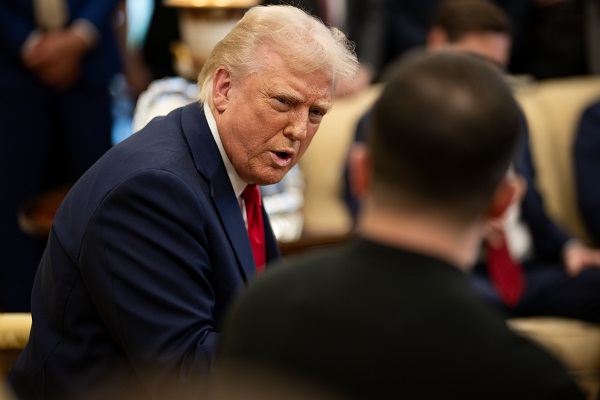.png)

Pandya, a communications professional, explores climate, energy transition, and security. Off the grid, he recharges with long-distance runs.
March 4, 2025 at 4:17 AM IST
The Trump-Zelenskyy face-off underscores a stark reality — the world is now contending with a radically supremacist and assertive United States, one that swears by MAGA and is determined to re-establish American primacy on its own terms. Whether through actions or rhetoric, Trump’s administration is relentlessly signalling that the era of sugar-coated diplomacy, porous borders, and open-ended commitments to battles of marginal interest to the US is over. If the world expects American intervention, assistance, or firepower, it must come with a clear price tag, set in the Oval Office. Room for negotiation has shrunk. Hard bargains are the new diplomatic currency.
Zelenskyy, to his detriment, learned this the hard way. Despite being cautioned by Republican heavyweights like Lindsey Graham to avoid direct confrontation with Trump, the Ukrainian president misread the moment. He believed his equation with Washington had not fundamentally changed, that the old playbook of appeals to shared values and historical ties would still work. It didn’t. Instead, he was publicly chastised, reminded of Ukraine’s dependence on American support, and warned that defiance would leave Kyiv to fend for itself in a grinding, inconclusive war now entering its fourth year.
This encounter laid bare a central truth about Trump’s second term — diplomacy, as it has long been practised, no longer holds sway in Washington. The veneer of warm embraces, camera-ready smiles, and carefully scripted joint statements has been stripped away. In its place stands a far more transactional, overtly hierarchical model where power is exercised, not implied. Trump, aided by his loyal ally JD Vance, used the Zelenskyy showdown to demonstrate exactly that — the United States will dictate the trajectory of this conflict, decide when and how peace talks happen, and assert its primacy in any negotiated settlement. Zelenskyy’s decision to publicly push back shattered the unwritten rules of subservient diplomacy, triggering an extraordinary and unvarnished verbal skirmish between two heads of state.
Where does this leave Ukraine? Barring some last-minute recalibration, it is evident that Europe, minus its transatlantic anchor, has little more than rhetorical support to offer Kyiv. With Washington reining in its cheque book and military aid increasingly conditional, Europe’s role is reduced to offering diplomatic platitudes and hollow affirmations of solidarity. In the vacuum left behind, London and Paris are reportedly exploring a jointly brokered peace proposal, one they hope to present for Trump’s personal endorsement. The proposed deal, while still under wraps, is expected to mark the end of NATO’s more ambitious designs — the vision of Ukraine as a forward operating base, keeping Russia permanently on edge.
There is, however, a deeper play at work — one that goes beyond immediate conflict resolution. The souring of the Trump-Zelenskyy equation could set in motion efforts to push for fresh elections in Ukraine, ensuring that Mariinskyi Palace is eventually occupied by someone more aligned with Trump’s worldview. In return for continued military and financial assistance, Kyiv would be expected to offer more than just strategic compliance. Ukraine’s vast reserves of critical minerals, including lithium and uranium, represent a prize too valuable for Washington to ignore. These minerals are central to the clean energy transition, the future of advanced manufacturing, and above all, America’s strategic contest with China. By securing privileged access to these resources, Trump could achieve a rare trifecta — blunt China’s stranglehold over global supply chains, secure an indispensable resource base for American industry, and simultaneously present himself as the architect of peace in Eastern Europe.
The conflict, while catastrophic for Ukraine, has already enriched the US defence industry. Ending the war would unlock the next phase — lucrative contracts for reconstruction, infrastructure, and civil works, benefiting a different set of players closer to Trump’s economic agenda. The defence contractors made their money during the war. Now, the construction majors will line up for their turn.
For Putin, this evolving script offers modest comfort. A formally neutral Ukraine, stripped of its NATO ambitions, would ease some of Russia’s long-term security concerns. Zelenskyy, on the other hand, risks becoming the ultimate fall guy — remembered not as the courageous wartime leader, but as the president who overplayed his hand and misjudged the mood in Washington at a critical moment. His failure was not merely one of bravado or ego, but of misreading power dynamics in a world where subtlety is no longer a diplomatic virtue, and deference — especially when you hold no cards — is the only rational strategy.
Diplomacy, after all, has always been the art of managing asymmetry without provoking humiliation. When illusions of parity take hold, the consequences tend to be swift, severe, and lasting.




